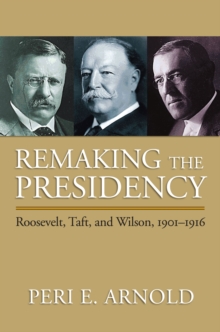Description
| Product ID: | 9780700618187 |
| Product Form: | Paperback / softback |
| Country of Manufacture: | US |
| Title: | Remaking the Presidency |
| Subtitle: | Roosevelt, Taft and Wilson, 1901-1916 |
| Authors: | Author: Peri E. Arnold |
| Page Count: | 278 |
| Subjects: | Political leaders and leadership, Political leaders & leadership, USA, c 1900 - c 1914 |
| Description: | In a period of American history marked by congressional primacy, presidential passivity, and hostility to governmental action, Theodore Roosevelt and Woodrow Wilson became iconic presidents through activist leadership. Peri Arnold, a leading presidential scholar, goes beyond the biographers to explain what really set Roosevelt apart from his predecessor William McKinley, how Wilson differed from his successor Warren G. Harding, and how we might better understand the forgettable William Howard Taft in between. This is the first comparative study of the three Progressive Era presidents, examining the context in which they served, the evolving institutional role of the presidency, and the personal characteristics of each man. Arnold explains why Roosevelt and Wilson pursued activist roles, how they gained the means for effective leadership in a role that had not previously supported it, and how each of the three negotiated the choppy crosscurrents of changing institutions and politics with entirely different outcomes. Arnold delineates the American political scene at the turn of the twentieth century, one characterized by a weakening of party organizations, the rise of interest groups and print media, and increasing demands for reform. He shows how the Progressive Era presidents marked a transition from the nineteenth century’s checks and balances to the twentieth’s expansive presidential role, even though demands for executive leadership were at odds with the presidency’s means to take independent action. Each of these presidents was uniquely challenged to experiment with the office’s new potential for political independence from party and Congress, and Arnold explains how each had to justify their authority for such experimentation. He also shows how their actions were reflected in specific policy case studies: the Northern Trust and naval modernization under Roosevelt, tariff reform and the Pinchot/Ballinger debate over conservation under Taft, and the Federal Reserve and Federal Trade Commission under Wilson. Ultimately, Arnold shows how the period’s ferment affected both the presidency and its incumbents and how they in turn affected progressive politics. More important, he helps us better understand two presidents who continue to inspire politicians of differing stripes and relates their leadership styles to the modern development of the presidency. |
| Imprint Name: | University Press of Kansas |
| Publisher Name: | University Press of Kansas |
| Country of Publication: | GB |
| Publishing Date: | 2009-09-30 |
